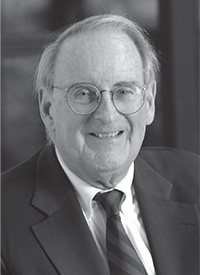 |
| Jonathan F. Fanton |
On October 8, 2016, 175 new Fellows and 37 new Foreign Honorary Members will be inducted into the American Academy. The Induction weekend is a wonderful occasion for Fellows and Foreign Honorary Members to meet one another, learn about the Academy’s work, and formally celebrate their election to the Academy. All members are invited to attend the programs and to meet and welcome the 2016 class of new members. New and returning members find the experience to be both stimulating and inspiring.
The Induction weekend also provides us with an opportunity to reflect on the founding of the Academy in 1780. From the beginning our institution was more than a society to honor leading scholars and professionals. The Academy’s charter, adopted on May 4, 1780, was clear “that the end and design of the institution is . . . to cultivate every art and science which may tend to advance the interest, honor, dignity, and happiness of a free, independent, and virtuous people.”
John Adams, John Hancock, James Bowdoin, and other founders believed the new nation would need strong, independent, expert advice. A fundamental part of this call to service was the recognition of the important role that the arts, humanities, and sciences would play in allowing educated citizens to participate in an open democracy, to nurture a strong economy, and to build a fair and just community.
Today, this call continues and the tradition of members participating actively in the life of the Academy is flourishing. Members, supported by a talented and dedicated staff, take the lead on projects and publications. Fellows serve as guest editors of our quarterly journal Dædalus, and in the past year, eighteen members contributed essays to the journal. In the last three years, 230 members have participated in Academy projects and studies, such as The Commission on Language Learning, The Global Nuclear Future, The Commission on the Future of Undergraduate Education, The Lincoln Project: Excellence and Access in Public Higher Education, and New Models for U.S. Science & Technology Policy. And our new Exploratory Fund supports members who want to work together to pursue subjects or topics of common concern. We have ten Exploratory Fund initiatives, involving 55 members, which have recently been completed or are in the planning stages. Some of these projects are exploring the state of legal services for low-income Americans, the preservation of intellectual legacies, and the future of jazz in America.
Over the last 236 years, members have gathered together to discuss important issues facing the nation and the world. In the past year, the Academy expanded the number of meetings for members held across the country, which highlighted topics explored in our projects, studies, and publications. Several meetings focused on the Academy’s recently launched Public Face of Science initiative, The Lincoln Project on Excellence and Access in Public Higher Education, and a forthcoming issue of Dædalus on Russia Beyond Putin. The Academy hosted 47 meetings in Cambridge and 44 meetings in 24 cities across the United States and abroad this past year. More than a thousand members participated in these meetings.
In addition, the Academy has formed regional program committees in several cities to bring local members together to advise on current Academy projects; to elevate the impact of Academy reports and publications; to explore topics of interest at the local or national level; and to provide opportunities for social and intellectual connection. The furthest along is the San Diego Program Committee, which has planned several events and receptions for local members on topics such as “Neuroscience and Architecture” and “At-Risk Global Heritage,” with a meeting scheduled in November on “Climate Change Science and Policy.”
Discussions among members on important topics can now happen through the Academy’s new online community, called Member Connection. For example, the Academy’s new project on Understanding the New Nuclear Age is using the Member Connection platform to facilitate the work of the project. Through the platform, members of the project’s working group are accessing, commenting, and discussing draft papers in advance of a meeting later this fall.
Looking ahead, in 2030 the Academy will celebrate its 250th anniversary. This milestone is an opportunity to reflect further on the nation that our founders imagined and ask, through an objective lens, how is “the democratic experiment” working? How can we continue to work together to make America the “city upon a hill” they sought, an example of a just and humane society with opportunity for all? We welcome your thoughts and suggestions of studies the Academy might undertake to assess the state of our democracy and to strengthen its ability to face the challenges of the future, in the spirit of our founders.
Let me conclude by returning to our founders’ call to service. Election to the American Academy is not only an honor, but also an opportunity to work with other talented people who care about research, institutions, core values of fairness and opportunity, peaceful relations among nations, and building communities to help each of us fulfill our potential. With modest financial resources, the key to all that the Academy can accomplish is the leadership and engagement of its members. So we invite you to come forward with an idea you want to pursue through the Academy, to volunteer to lead a local program committee, to join a project, or to contribute to a publication. Let us work together to fulfill the vision of our founders. In their words: “It is the part of a patriot-philosopher to pursue every hint – to cultivate every enquiry, which may eventually tend to the security and welfare of his fellow citizens, the extension of their commerce, and the improvement of those arts, which adorn and embellish life.”
